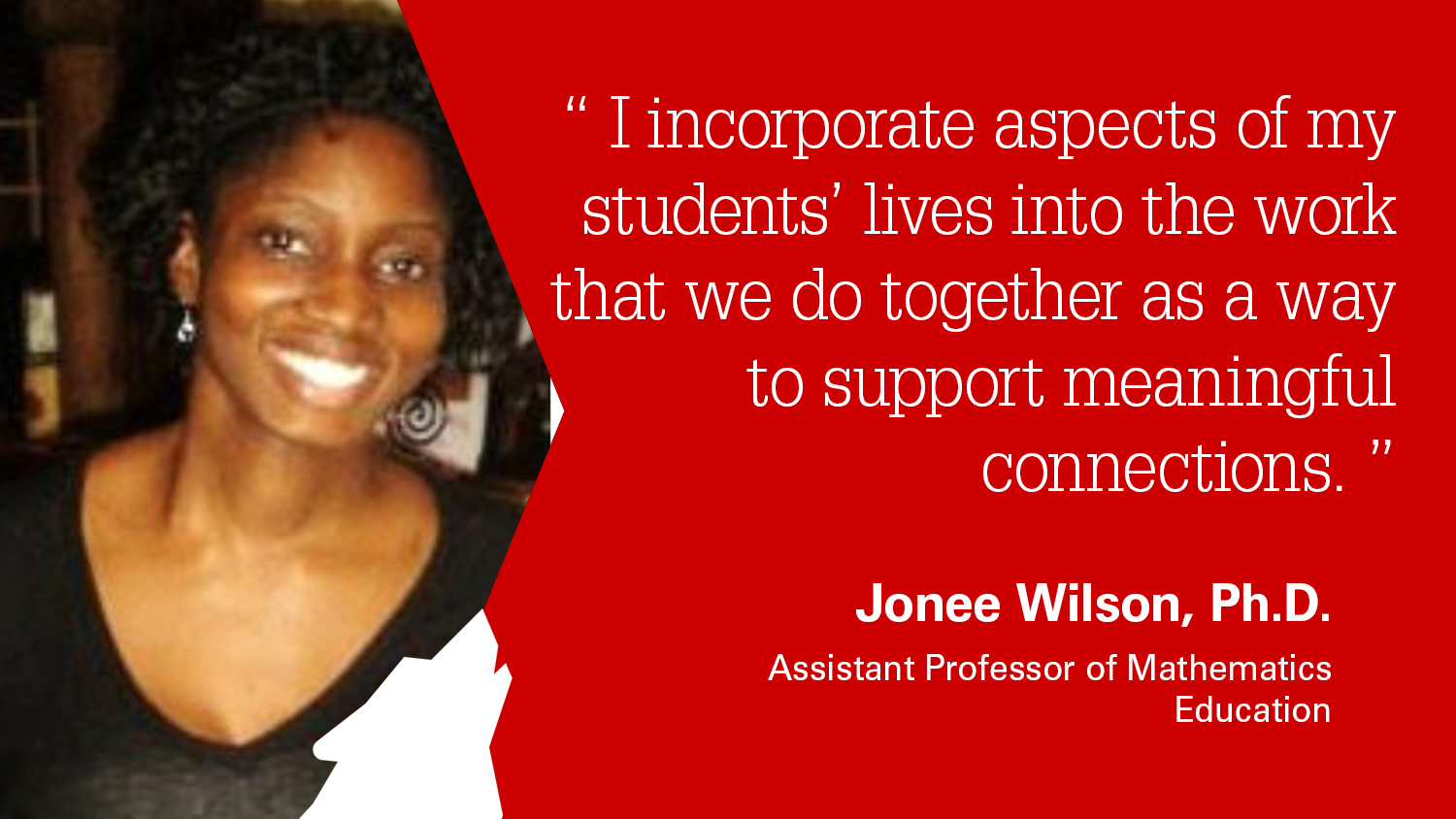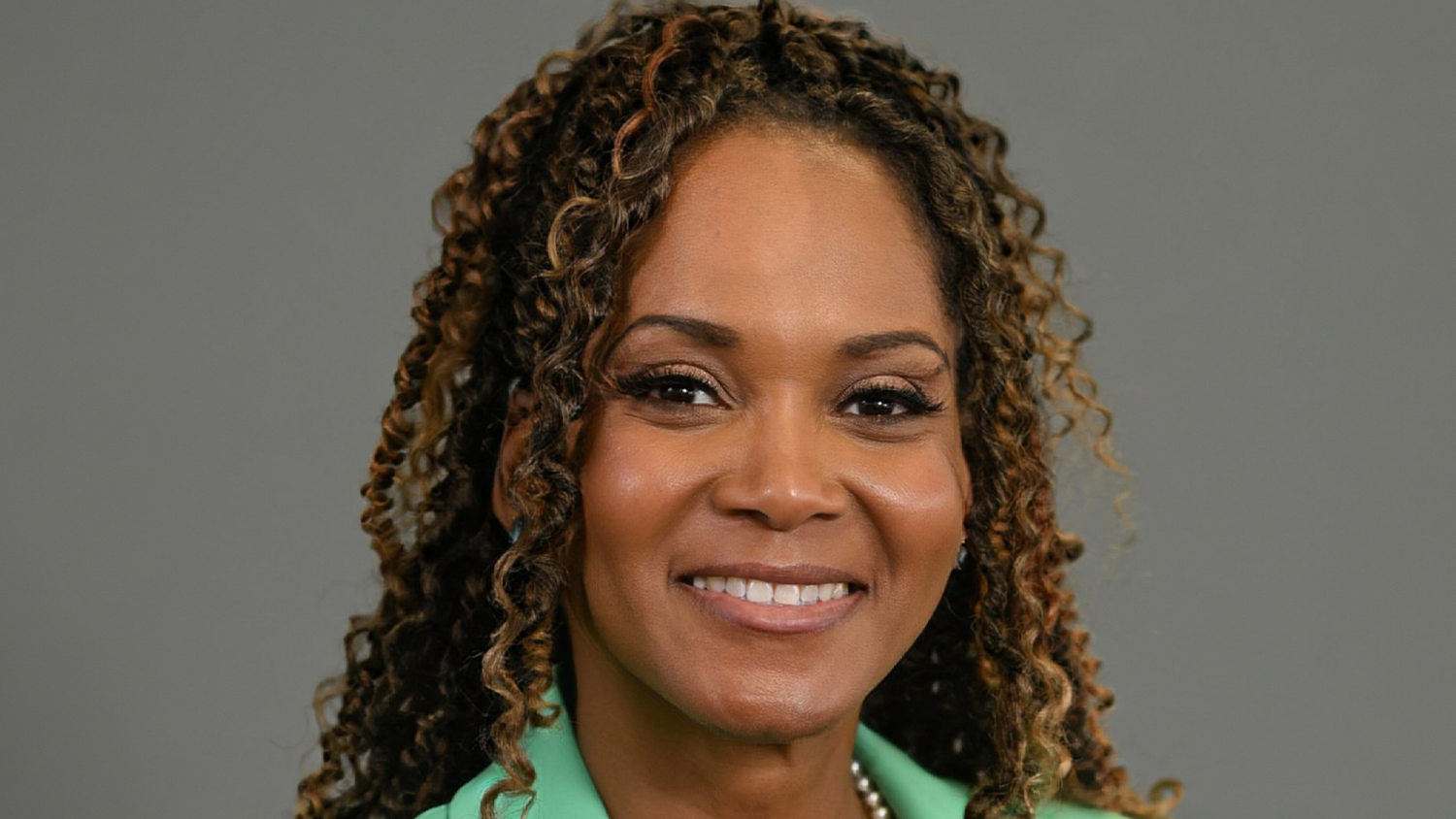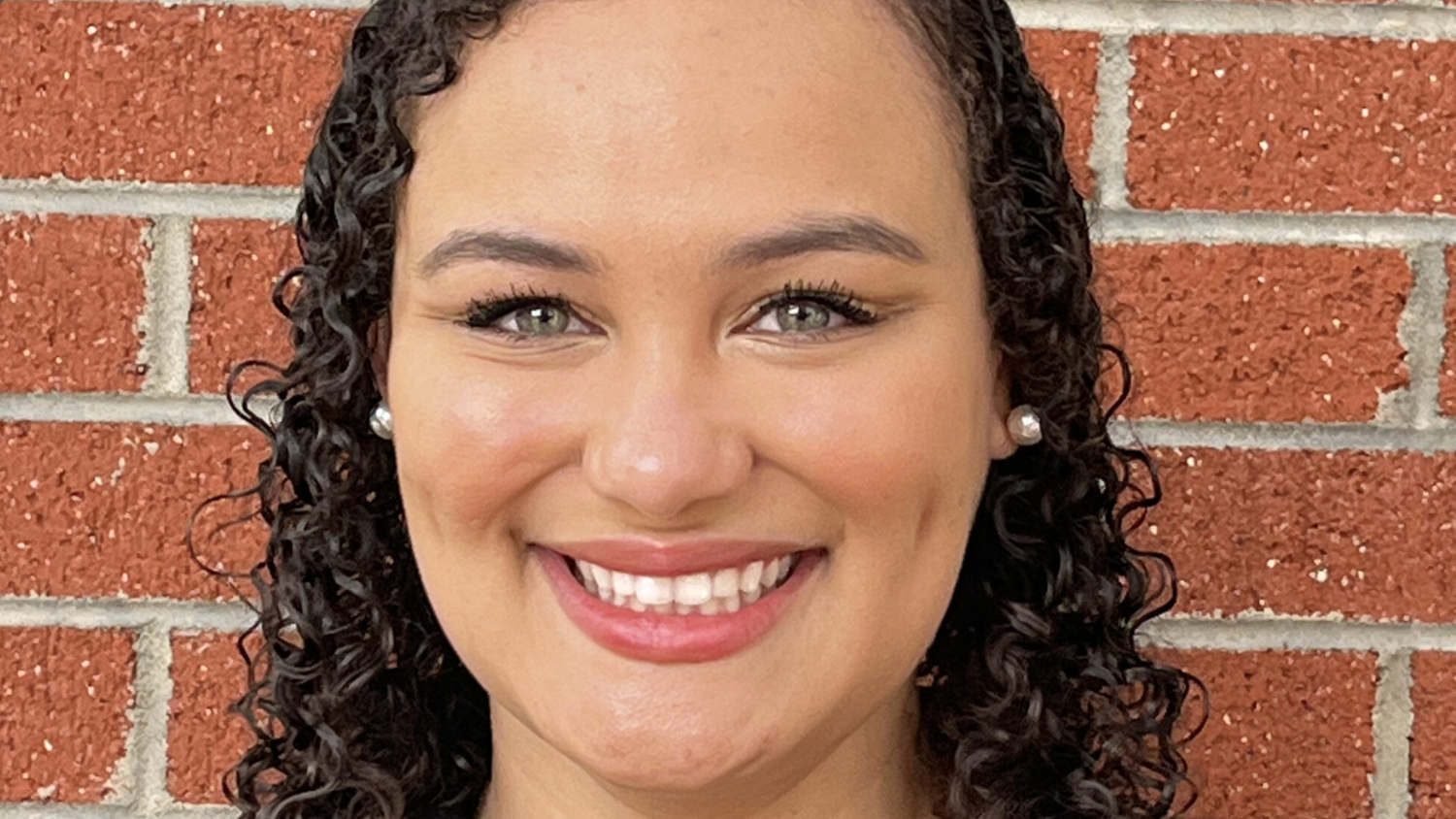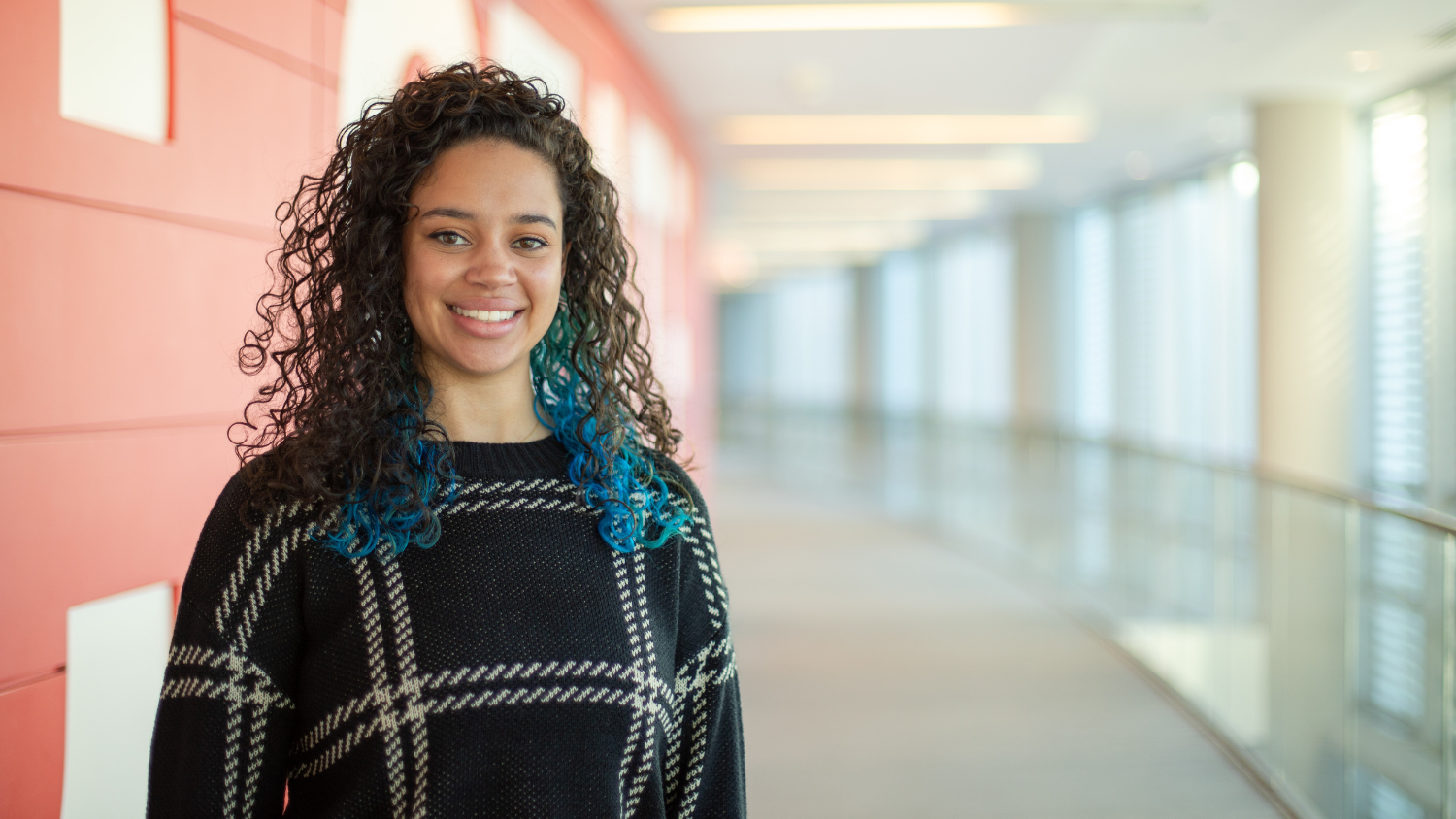Assistant Professor Jonee Wilson: ‘Teaching is About Providing Meaningful Opportunities for Students to Genuinely Wrestle with Important Ideas and to Solve Authentic Problems’

Jonee Wilson, Ph.D., assistant professor of mathematics education in the NC State College of Education, believes that the richest learning opportunities for her students come from actual experiences.
Whether she is teaching undergraduate students in the elementary education program or graduate students who are preparing to become scholars themselves, Wilson believes it is important to provide opportunities for students to approximate the practices they are learning and will be expected to implement as professionals.
“I provide opportunities for my students to plan and implement lessons and I give them feedback based on their instruction,” she said. “I provide feedback on how to be more culturally responsive in their instruction, how to select activities and tasks that will empower their students, how to teach in ways that are accessible and push every one of their students as well as how to plan lessons that support students in further developing their cultural and mathematical identities.”
As a former classroom teacher, Wilson noticed that educational systems are often designed in ways that leave students behind and in ways that perpetually and disproportionately underserves specific groups of students, especially when it comes to learning mathematics.
She realized that even though a lot of things are outside of a classroom teacher’s control, work could be done by educators to improve their instruction and to provide better support for students. It was this idea that led to her commitment to supporting better access to and participation in rigorous mathematics for students who have been historically underrepresented.
Wilson’s work on the Equity and Access Rubrics for Mathematics Instruction (EAR-MI) project identified practices of teachers in classrooms characterized by high-quality teaching and where African American and emergent multilingual students showed better growth on mathematics achievement tests than would be predicted by their prior performance. Seven common practices used by these teachers were outlined in “Investigating Teaching in Conceptually Oriented Mathematics Classrooms Characterized by African American Student Success.” The paper, published in the Journal for Research in Mathematics Education, earned Wilson an Early Career Publication Award from the AERA Special Interest Group in Research in Mathematics Education (SIG-RME).
“The rubrics help to build strong connections between theory about equitable mathematics instruction and the work of actually putting this theory into practice,” Wilson said. “Because of the incremental structure of the rubrics, EAR-MI could also be used to provide insights for teachers into how they could improve on specific instructional practices that are based on their own current practice.”
Wilson is now the principal investigator on the $2.3 million, National Science Foundation-funded Validation of the Equity and Access Rubrics for Mathematics Instruction (VEAR-MI) project to validate those rubrics with the goal of improving mathematics success for African American and emergent multilingual students.
The project directly links the seven instructional practices to student achievement and participation, and takes steps to specify and measure practices that are necessary to adequately support those who have been historically underserved in K-12 mathematics.
“Our work in validating the EAR-MI rubrics promotes the use of these rubrics which are proving to be helpful in identifying and supporting the development of classrooms that are aiming for equity,” she said. “This work has already helped professional developers, teacher educators, content-specific coaches as well as pre- and in-service teachers in developing their respective practices. I am excited to continue investigating these and other practices and am thrilled to see that practitioners value this work.”
For Natalia Yanez Castillo ’24PHD, who serves as a graduate research assistant on the VEAR-MI project, working with Wilson has been a huge inspiration.
As a former elementary school teacher, Castillo decided to pursue a doctoral degree because she noticed inequities in her school that she wanted to change, but did not have the tools or information necessary to do so.
Through informal discussions with Wilson and her work on the VEAR-MI project, Castillo said that she has received great guidance and a renewed push to continue her research focus on diversity and equity in mathematics education.
“I think what she’s doing is huge. The fact that she’s working on something that hasn’t been developed before and she’s so passionate about it; it has sparked my interest even more in trying to research about different ways that teachers can work to provide students not only with meaningful learning experiences but contextualized ones where students are acknowledged and their cultural characteristics can be seen and included,” Castillo said.
Castillo said Wilson also does an excellent job of providing her students with a safe space to talk, which was particularly important when courses transitioned to a virtual format during the Spring 2020 semester.
Castillo said Wilson gave students an opportunity to share their struggles and feelings and checked-in to make sure they weren’t feeling overwhelmed.
“I try to be flexible and responsive to my students’ needs. I include many opportunities to genuinely get to know my students and form connections with them. I also incorporate aspects of my students’ lives into the work that we do together as a way to support meaningful connections between their personal contexts and the content that we are learning in class,” Wilson said.
While providing support for her students, Wilson also constantly pushes them to advance their thinking, said doctoral student Frederique Yova ’21PHD.
“She knows how to raise the critical questions that will make her students think in depth, and engage with meaningful discussions. She also provides feedback that is always right to the point to make you take a step further,” Yova said.
Of all the things students will learn from her, however, Wilson said that she wants future teachers who take her classes to understand that making mistakes is an important part of the learning process.
Wilson noticed that many pre-service and beginning teachers often place too much emphasis on having lessons that “run smoothly,” which means that they are less likely to provide opportunities for their students to explore, try new things, ask questions and make mistakes.
She hopes that future teachers leave her class with the belief that mistakes can be used as opportunities to deepen understanding and that it is important to invest in rich activities that provide these opportunities for students.
“Teaching is not simply getting through all of the material smoothly. It is about providing meaningful opportunities for students to genuinely wrestle with important ideas and to solve authentic problems,” she said. “Mistakes are not just a part of the learning process, they are often actually the start of the learning process. Therefore, not only are mistakes okay, but they should be welcomed.”
- Categories:


